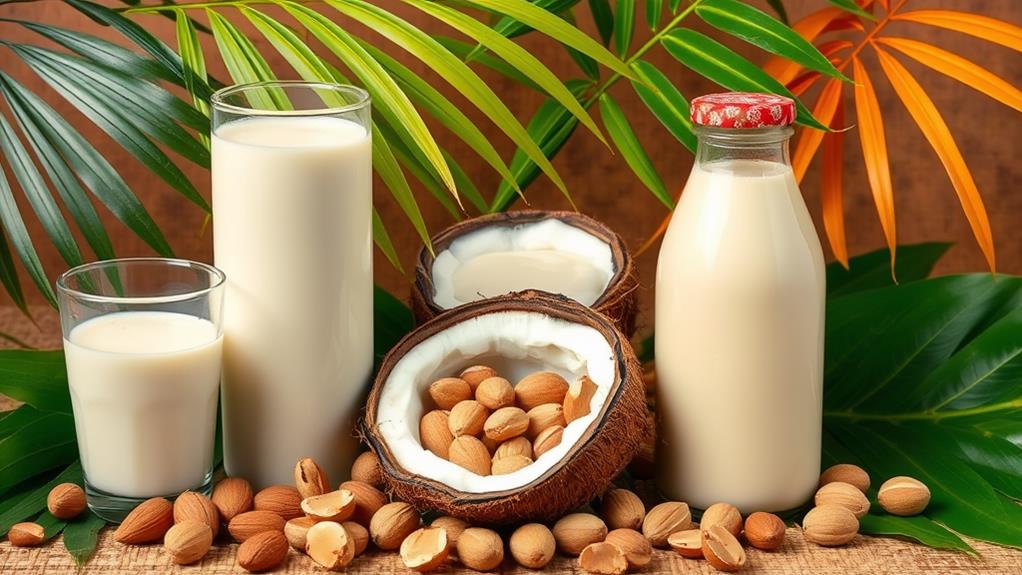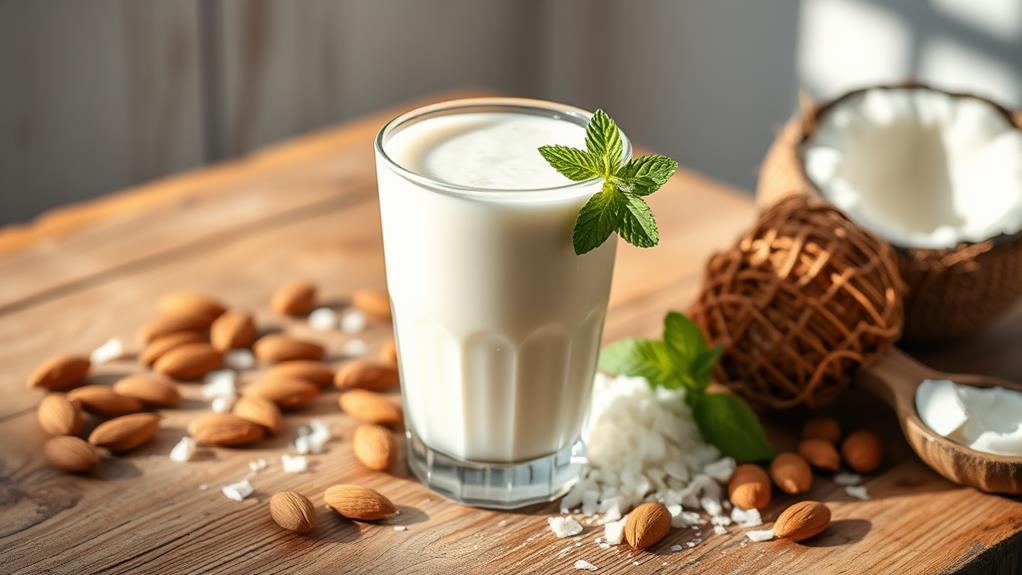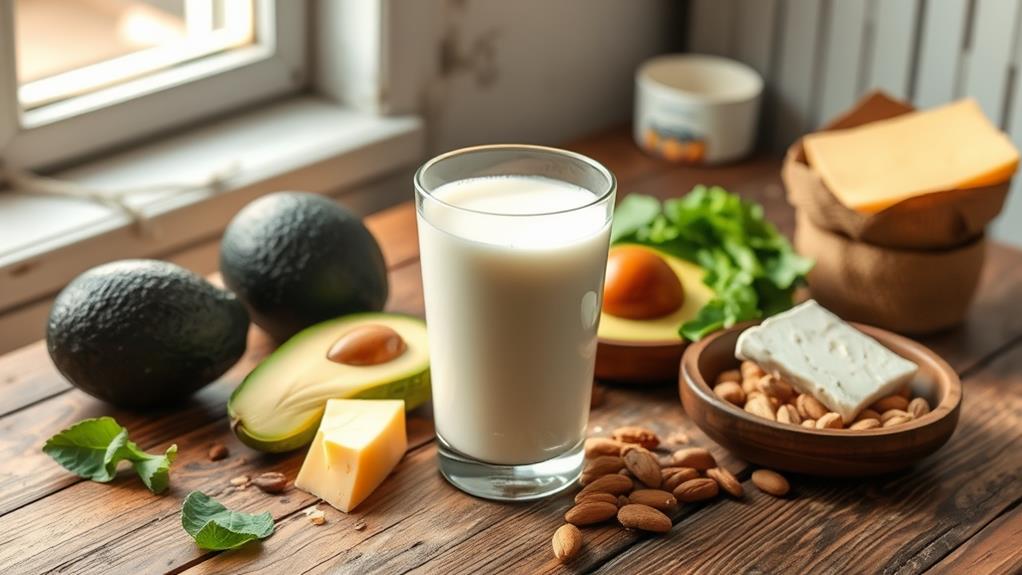To keep milk keto-friendly, you should opt for varieties with low net carbs—under 3 grams per cup—and avoid added sugars. Unsweetened almond milk, macadamia nut milk, and flax milk are excellent choices, offering minimal carbs while being rich in healthy fats. Regular cow's milk, however, contains about 12 grams of carbs per cup, which can disrupt ketosis. It's essential to check nutritional labels for hidden sugars that might kick you out of ketosis. By choosing wisely, you can enjoy milk on your keto journey. There's much more to discover about milk options and their benefits.
Overview of the Keto Diet
The keto diet is a low-carb eating plan designed to shift your body into a state of ketosis, where it burns fat for fuel instead of carbohydrates. By considerably reducing your carbohydrate intake to just 5-10% of your total daily calories—typically between 20-50 grams—you'll encourage your body to utilize fat as its primary energy source.
This approach not only promotes weight loss but also improves insulin sensitivity, leading to better blood sugar control and overall metabolic health.
A typical macronutrient ratio for the keto diet consists of approximately 50-60% fats, 30-35% protein, and only 5-10% carbohydrates. This low carb structure helps optimize your body's ability to enter and maintain ketosis.
To keep track of your progress, monitoring ketone levels through urine testing can be beneficial, allowing you to assess how well your body is adapting to the keto diet.
Before diving into this eating plan, it's vital to have a consultation with a healthcare professional, especially if you have specific medical conditions or dietary restrictions.
Embracing the keto diet can lead to various health benefits, so understanding its framework and requirements is essential for success.
Key Considerations for Keto Milk
Choosing the right milk is essential to staying on track with your keto diet. You'll want to focus on options that have low net carbs, ideally under 3 grams per cup, to maintain ketosis. Unsweetened varieties are your best bet, as added sugars can greatly increase carbohydrate content and disrupt your progress.
Additionally, understanding the carbohydrate content of different dairy products is vital for making keto-friendly choices; for instance, regular dairy milk, including cow's and goat's milk, contains around 11-12 grams of lactose per cup, which is too high for a keto-friendly option.
Understanding carbohydrate content can help guarantee you select appropriate alternatives. Be sure to read nutritional labels carefully. Different brands can have varying carb counts due to their production methods and added ingredients.
When exploring milk alternatives, steer clear of those with fillers or high-carb ingredients like rice powder; these can raise the overall carb counts. Stick to options that explicitly mention they're low in carbs and don't contain added sugars.
Keto-Friendly Milk Alternatives

When you're on a keto diet, choosing low-carb milk alternatives is essential.
Unsweetened options like almond, macadamia nut, and flax milk are great picks, keeping your carb intake in check.
Low-Carb Milk Options
For those on a keto diet, finding suitable milk alternatives can be a game changer. Low-carb milk options are essential to keep your carb intake in check while enjoying creamy beverages.
Unsweetened almond milk is a popular choice, containing only 1g net carbs per cup. If you're looking for something even lower, Macadamia nut milk stands out with 0g net carbs per cup, plus it's high in fat, offering healthy monounsaturated fats.
Flax milk is another great option, providing 1g net carbs per cup and packed with omega-3 fatty acids, making it a nutritious addition to your smoothies.
Unsweetened coconut milk can vary, typically ranging from 1g to 6g net carbs per cup, so always check the label to find the best fit for your diet.
Pea milk also makes the list, featuring 2g net carbs per cup and offering a creamy texture along with 8g of protein.
With these keto-friendly milks, you can enjoy your favorite recipes and beverages without compromising your dietary goals.
Unsweetened Variants Preferred
Many keto dieters prefer unsweetened milk alternatives to keep their carb intake low while enjoying delicious beverages.
Unsweetened almond milk is a popular choice, offering just 1 gram of net carbs per cup. If you're looking for the best keto-friendly options, macadamia nut milk stands out with a negligible 0 grams of net carbs per cup.
Flax milk is another excellent choice, providing 1 gram of net carbs and being rich in omega-3 fatty acids.
Unsweetened coconut milk can also be a great addition to your keto diet, though you should check the labels, as carb content can vary by brand. Some may contain as low as 1 gram of net carbs.
Worst Milk Choices for Keto
When you're on a keto diet, not all milk options are created equal. High carb content can sneak up on you, especially with choices like cow's and goat's milk, which both pack in around 12 grams of net carbs per cup.
Additionally, the Keto diet focuses on reducing carbohydrates, making it essential to choose milk alternatives that won't affect your cholesterol management, as lower carb options can help support improved HDL cholesterol levels.
Plus, added sugars in options like sweetened condensed milk can completely derail your ketosis efforts.
High Carb Content
A variety of milk options can derail your ketogenic diet if you're not careful, especially those with high carbohydrate content.
Cow's milk contains approximately 12 grams of net carbs per cup, primarily from lactose, making it unsuitable for strict keto dieters. Goat's milk is similarly high in carbs, offering about 11 grams of net carbs per cup, which also disqualifies it from a keto-friendly diet.
Oat milk has an even higher carb content, with around 17 grams of net carbs per cup, due to its grain base that isn't compatible with low-carb diets. If you're serious about maintaining your carb intake, you'll want to steer clear of rice milk, which is among the worst choices for keto, containing approximately 21 grams of net carbs per cup.
Lastly, sweetened condensed milk is a major no-go; it packs about 166 grams of net carbs per cup, making it one of the least suitable options for anyone following a ketogenic diet.
When choosing milk, always check the labels to avoid these high carb options that can sabotage your keto journey.
Lactose Issues
High lactose content in various milk options can pose significant challenges for those adhering to a ketogenic diet. When you follow a keto lifestyle, it's essential to keep your net carbs low, and many popular milk choices simply don't fit the bill.
For instance, cow's milk is high in carbs, containing around 12 grams of net carbs per cup, primarily from lactose. Similarly, goat's milk, at about 11 grams of net carbs per cup, should also be avoided on a keto diet.
Oat milk is another poor choice, packing a whopping 17 grams of net carbs per cup, while rice milk is even worse, boasting around 21 grams. These high lactose content options can easily kick you out of ketosis.
Sweetened condensed milk is a definite no-go, with a staggering 165 grams of net carbs per cup.
To stay compliant with your keto goals, opt for unsweetened versions of milk alternatives that are low in carbs, such as almond or coconut milk.
Prioritize high fat over high lactose content to maintain your state of ketosis effectively.
Added Sugars
Added sugars in milk products can quickly sabotage your ketogenic efforts. Many sweetened versions of keto-friendly milks contain added sugars that greatly increase their carbohydrate content, making them unsuitable for a keto diet.
For instance, sweetened condensed milk packs a staggering 165 grams of net carbs per cup, a disastrous choice for anyone watching their carb intake.
Oat milk, often marketed as a healthy alternative, is also high in carbs, with around 17 grams of net carbs per cup due to its sugar content.
Even cow's milk, which contains about 12 grams of net carbs per cup, is problematic because it's high in lactose, a natural sugar. Goat's milk isn't much better, offering around 11 grams of net carbs per cup for the same reason.
Rice milk is one of the worst offenders, containing approximately 25 grams of carbohydrates per cup, far exceeding the limits for a keto diet.
To stay on track, stick with unsweetened dairy foods that are low in carbs and free of added sugars, ensuring you maintain your ketogenic goals.
Health Benefits of Keto Milk

Keto-friendly milks offer a range of health benefits that can enhance your low-carb lifestyle. Options like almond milk and macadamia nut milk contain low net carbs, with just 1g and 0g per cup, respectively. This makes them perfect for maintaining ketosis while enjoying your beverages.
Additionally, the ketogenic diet promotes anti-inflammatory effects, which can further support overall health when incorporating these milks. Almond milk is particularly significant, as it's high in Vitamin E and calcium, both essential for supporting bone health.
Many keto milks, such as flax and coconut milk, are rich in healthy fats. These fats provide energy and promote satiety, which aids in weight management and keeps you feeling fuller for longer. Choosing unsweetened varieties helps you avoid added sugars, allowing for better blood sugar control and reducing the risk of insulin spikes.
Additionally, consuming keto-friendly milks can support heart health. Some options, like macadamia nut milk, are rich in monounsaturated fats that are beneficial for your cardiovascular system.
Tips for Choosing Keto Milk
When selecting a milk alternative for your ketogenic diet, it's essential to prioritize unsweetened varieties to keep your carb intake low. Unsweetened almond milk and coconut milk are great options, typically containing just 1-2g net carbs per cup. These keto-friendly milk options help you stay within your carb limits while still enjoying a creamy texture.
Additionally, consider enhancing your salads with keto-friendly condiment recipes that can pair well with your milk options. Be vigilant about added sugars and fillers. Some brands might sneak in hidden carbohydrates that can disrupt your ketosis. Always check nutritional labels before making a choice.
If you're looking for the best low-carb option, consider macadamia nut milk, which remarkably has 0g net carbs per cup.
While you might enjoy dairy options, be cautious with traditional cow's milk. It contains about 12g net carbs per cup, making it a poor choice for strict keto adherence. Familiarize yourself with different brands, as their carb counts can vary greatly.
Conclusion
In summary, choosing the right milk can make all the difference on your keto journey. Did you know that only about 20% of people stick to the keto diet long-term? That means finding delicious, keto-friendly milk options is vital for your success. By opting for unsweetened almond or coconut milk, you can enjoy your favorite beverages without sabotaging your goals. So, keep these tips in mind and savor every sip while staying on track!







